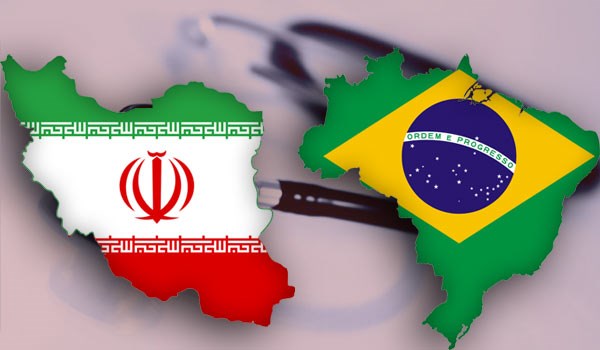
Iran-Brazil Trade Unaffected by US Sanctions

Majid Movafeq Qadiri, who serves as the Head of Iran’s Feed Industry Association, confirmed on Sunday the reports suggesting that Brazil ships a bulk of its annual corn export, around nine million tons, to Iran, saying sanctions imposed by the United States would effectively fail to hamper a massive amount of trade between the two countries.
“Iran buys around 30 percent of Brazil’s corn exports and (the total) Brazilian annual exports to Iran is worth $2 billion,” he added.
The remarks came a day after two Iranian ships stranded for more than a week off Brazil’s coast began to sail toward Iran after the Supreme Court overturned an earlier ruling which banned refueling the ships due to US’ unilateral sanctions on Iran.
The verdict came after Iran threatened that it would reconsider its trade ties with Brazil and after Brazilian companies warned that refusing to give fuel to Iranian ships would cause economic losses for Brazil.
Movafeq Qadiri dismissed concerns that Iran’s grains inventory would suffer losses if Brazil wants to follow the US sanctions and avoid refueling Iranian ships loaded with corns and other products, including soybeans, sugar and meat.
“This issue has not affected the domestic markets as such as the strategic stocks and the size of the corn imported into the country’s ports are unprecedented in the past 60 years,” the official added.
Iran is reportedly testing a new trade route with Brazil as ships carry urea to the South American country and return home with corn. That comes as Iran seeks to increase its export of petrochemicals to cope with the impacts of US sanctions on direct oil sales.
Earlier this month, Iranian First Vice-President Eshaq Jahangiri said that Iran’s petrochemical production capacity is expected to reach 90 million tons per year in 2020, saying that the industry’s annual output will witness an almost 50% rise from the current yearly production of 64 million tons.
Last month it was announced that Iran is building 14 petrochemical projects in Phase I of Parsian Energy Intensive Industrial Special Economic Zone (PEIISEZ) which will increase the country’s petrochemical output by 15 million tons per year.
Early in June, Iranian Ambassador to Brasilia Seyed Ali Saqqayeean and Vice President of Brazil Hamilton Mourão in a meeting in the Brazilian capital city, exchanged views on ways to broaden bilateral relations between the two countries.
Back in November, Former Brazilian President Fernando Collor de Mello asserted that his country is determined to develop bilateral ties with Iran in areas of economy and environment.



Trump weighs using $2 billion in CHIPS Act funding for critical minerals

Codelco cuts 2025 copper forecast after El Teniente mine collapse

Electra converts debt, launches $30M raise to jumpstart stalled cobalt refinery

Barrick’s Reko Diq in line for $410M ADB backing

Abcourt readies Sleeping Giant mill to pour first gold since 2014

Nevada army depot to serve as base for first US strategic minerals stockpile

SQM boosts lithium supply plans as prices flick higher

Viridis unveils 200Mt initial reserve for Brazil rare earth project

Tailings could meet much of US critical mineral demand – study

Kyrgyzstan kicks off underground gold mining at Kumtor

Kyrgyzstan kicks off underground gold mining at Kumtor

KoBold Metals granted lithium exploration rights in Congo

Freeport Indonesia to wrap up Gresik plant repairs by early September

Energy Fuels soars on Vulcan Elements partnership

Northern Dynasty sticks to proposal in battle to lift Pebble mine veto

Giustra-backed mining firm teams up with informal miners in Colombia

Critical Metals signs agreement to supply rare earth to US government-funded facility

China extends rare earth controls to imported material

Galan Lithium proceeds with $13M financing for Argentina project

Kyrgyzstan kicks off underground gold mining at Kumtor

Freeport Indonesia to wrap up Gresik plant repairs by early September

Energy Fuels soars on Vulcan Elements partnership

Northern Dynasty sticks to proposal in battle to lift Pebble mine veto

Giustra-backed mining firm teams up with informal miners in Colombia

Critical Metals signs agreement to supply rare earth to US government-funded facility

China extends rare earth controls to imported material

Galan Lithium proceeds with $13M financing for Argentina project

Silver price touches $39 as market weighs rate cut outlook

















